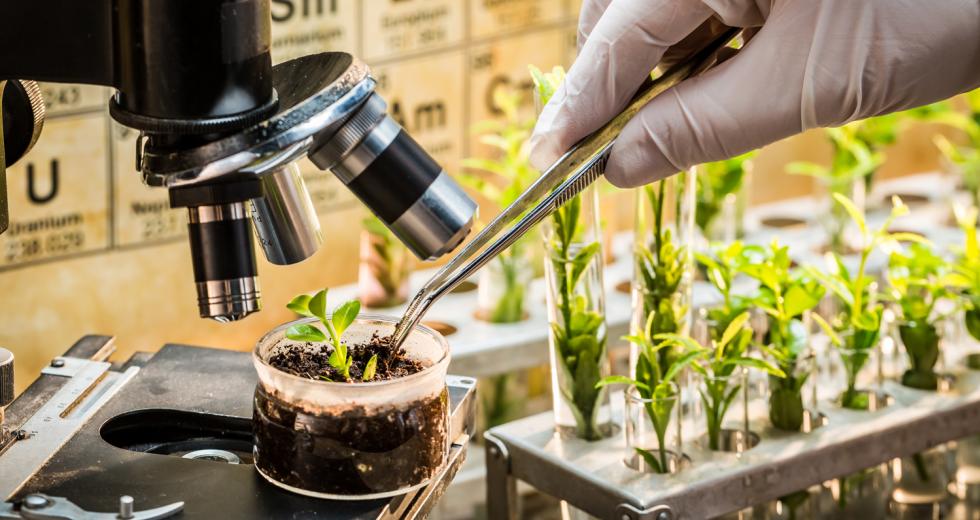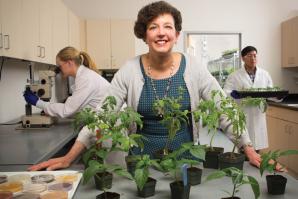In the 27 years I have lived in Davis, there has only been one sizeable business park with wet lab space for life sciences and ag biotechnology companies, which is University Research Park at the corner of Drew Avenue and Richards Boulevard. Each and every time another proposed development for wet lab space comes up to the Davis City Council or to voters, it fails to get a green light.
Wet labs are essential for research, particularly in biotech: They are laboratories with space for storage and conducting experiments, with sinks and hoods to ventilate hazardous fumes and vapors, and an autoclave (a pressure chamber) to sterilize and make media. A wet lab typically has space for refrigerators, incubators and growth chambers to grow plants and conduct temperature-controlled experiments.
Photo Gallery: UC Davis Big Bang! Business Competition
University Research Park was developed starting in 1990 by Interland (and recently sold to developer Mark Friedman). In 1990, I had recently moved to Davis to set up the first R&D subsidiary outside of Denmark for the Danish insulin and industrial enzyme company, Novo Nordisk. I was Interland’s first life sciences tenant, sharing an office with Don Lewis, president of Interland, while Novo Nordisk Entotech’s lab and office facility was designed and constructed. From design to occupancy was less than a year. I moved my second biopesticide endeavor, AgraQuest, into University Research Park in 1999 and my third biopesticide company, Marrone Bio Innovations, there in 2014. I helped Novo Nordisk Biotech, another subsidiary (now Novozymes Biotech) move there in 1992, where they still reside.
Since then, despite many attempts over nearly three decades, no other business park in Davis with wet lab space suitable for growing companies like the ones I created have come to fruition. Most recently was the Nishi Gateway project, which was rejected by the city’s voters in June 2016. It seems to me that a developer, the City Council and Davis residents can craft a project that will pass muster with characteristics local residents expect: green, clean, R&D-based businesses in a development that is sustainable and environmentally-friendly; creates jobs for residents, UC Davis students and graduates; minimizes traffic effects and does not have too much housing. Housing can be incompatible with laboratories and greenhouses; lighting from greenhouses can annoy residents and local ordinances may not allow quantities of common laboratory chemicals and reagents nearby schools and residential areas.
Despite the obstacles, progress has been made in the startup ecosystem in Davis and throughout the region. The programs of the now-defunct Sacramento Area Regional Technology Alliance were dispersed, including AgStart, which is now operating as its own nonprofit organization in Woodland. AgStart incubates ag tech companies that do not need lab space. Likewise, Davis Roots incubator downtown incubates startup companies by providing a mentoring network and support in preparing a more detailed nine-month launch strategy, which includes project and funding milestones. Once the strategy is completed and their plan is accepted, new ventures are given office space within Davis Roots for a designated period of time.
Additionally, the UC Davis Graduate School of Management has many programs for entrepreneurs through the Mike and Renee Child Institute for Innovation and Entrepreneurship, such as the Big Bang! Business Competition, which awards monetary prizes to teams of entrepreneurs who pitch their new business ideas. The institute also has the Biomedical + Engineering and Food and Ag Entrepreneurship Academies. The university’s Venture Catalyst program partnered with the company HM Clause to launch a business incubator, and the World Food Center recently brought the Ag Innovation Showcase to Davis. There are many other organizations that support entrepreneurs and startups — too numerous to name — such as Hacker Lab in Midtown Sacramento and Rocklin, and Jack Crawford’s Impact Venture Capital based in Sacramento. But once graduating from these programs, the wet lab space in the region is limited.
Related: Area 52 to Launch Local Startups
Notably in Davis, Area 52 was conceptualized by Mike Hart and Tim Keller, UC Davis alumni, with Keller a winner in the university’s 2008 Big Bang! competition. Dr. Rob White, of Sierra Energy, is overseeing the project (for more details, visit www.SierraEnergy.com).* Area 52, on Research Park Drive, is a 36,000-square-foot building that will have 20 offices, two wet labs, a fully-equipped machine shop, composites shop and computer lab. The building is owned by Sierra Energy, a waste gasification company (also founded out of the Big Bang! competition) and is investing more than $1 million in renovations for the facility.
The plain truth is that many entrepreneurs and spin-offs from UC Davis want to stay in Davis, A city that provides an unparalleled quality of life and work. The convenience of being close to the university is critical.
This Area 52 project does help fill the need for wet lab space for growing life science and biotech companies. However, when the startup companies grow out of their incubator and need more space, there is very little for them to move into.
Certainly our regional leaders have tried to address this need by developing space in other areas outside of Davis, such as McClellan Business Park. The Yolo County cities of Woodland and West Sacramento have always been business-friendly, with a welcome mat for relocating or new businesses.
But the plain truth is that many entrepreneurs and spin-offs from UC Davis want to stay in Davis, a city that provides an unparalleled quality of life and work. The convenience of being close to the university is critical — students can bike to their internship locations between classes. Company scientists can hop over to use the library, or rent laboratory equipment or facility space. They can meet with professors to discuss research and develop collaborations, enlist Graduate School of Management teams to conduct market research, give a lecture and attend networking events. More wet lab space means more companies locate in Davis and stay in Davis as they grow, creating more jobs.
Let’s work together to move forward a wet lab research park that is in sync with Davis values, that residents can appreciate, and provides space for the growing companies spun out of the world-class university here or those elsewhere.
* Editor’s note: This article has been updated to include additional information about the Area 52 project, including that Mike Hart was involved in its conception and Dr. Rob White, of Sierra Energy, is now overseeing the project.
Recommended For You

Cracking the Glass
Local leaders weigh in on the state of gender equality in the workplace
Focusing on four sectors — STEM, justice, development and investment — we rounded up some of the city’s key leaders: a district attorney, a med school dean, the head of an FBI office and enough CEOs to rival “Shark Tank,” to get their take on how women are perceived in their industries, how that perception has changed over time and what it will take to truly reach parity.




